初一英语下学期unit5 I'm watching tvPPT优选课件
- 格式:ppt
- 大小:1.04 MB
- 文档页数:17
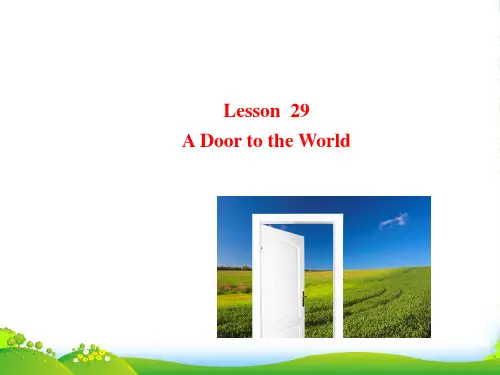
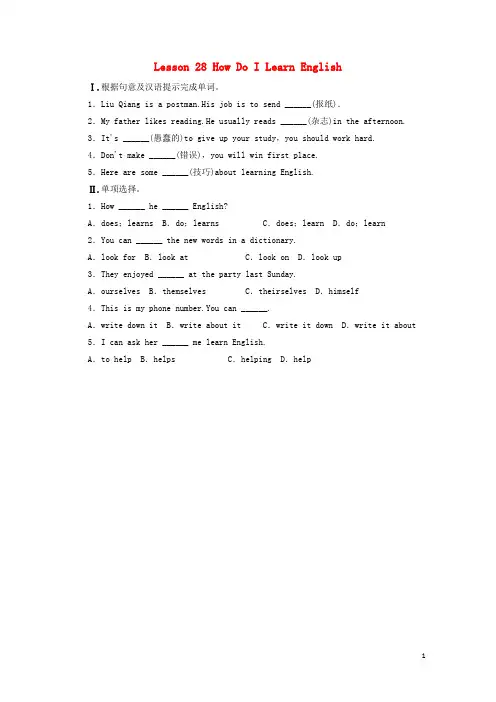
Lesson 28 How Do I Learn EnglishⅠ.根据句意及汉语提示完成单词。
1.Liu Qiang is a postman.His job is to send ______(报纸).2.My father likes reading.He usually reads ______(杂志)in the afternoon. 3.It's ______(愚蠢的)to give up your study,you should work hard.4.Don't make ______(错误),you will win first place.5.Here are some ______(技巧)about learning English.Ⅱ.单项选择。
1.How ______ he ______ English?A.does;learns B.do;learns C.does;learn D.do;learn 2.You can ______ the new words in a dictionary.A.look for B.look at C.look on D.look up3.They enjoyed ______ at the party last Sunday.A.ourselves B.themselves C.theirselves D.himself4.This is my phone number.You can ______.A.write down it B.write about it C.write it down D.write it about 5.I can ask her ______ me learn English.A.to help B.helps C.helping D.help参考答案Ⅰ.1.newspapers 2.magazines 3.silly 4.mistakes 5.skillsⅡ.1.C点拨:本题考查的是一般现在时的特殊疑问句。
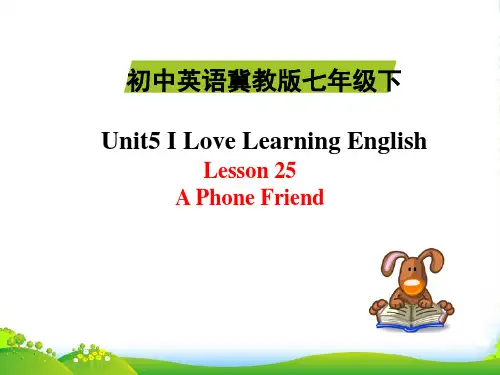
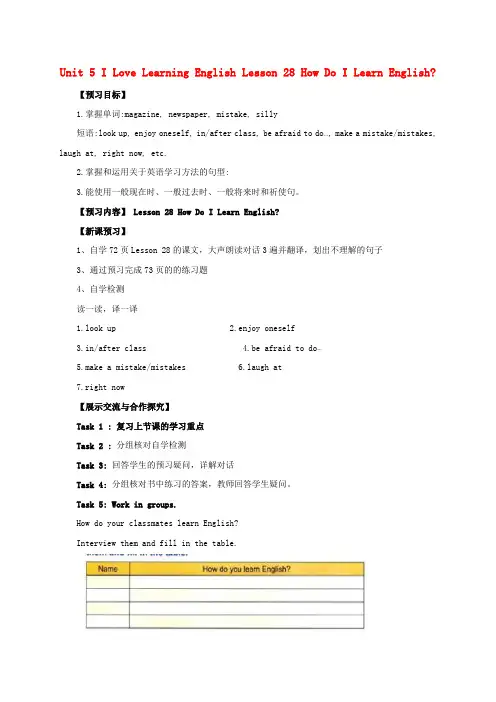
Unit 5 I Love Learning English Lesson 28 How Do I Learn English?【预习目标】1.掌握单词:magazine, newspaper, mistake, silly短语:look up, enjoy oneself, in/after class, be afraid to do…, make a mistake/mistakes, laugh at, right now, etc.2.掌握和运用关于英语学习方法的句型:3.能使用一般现在时、一般过去时、一般将来时和祈使句。
【预习内容】Lesson 28 How Do I Learn English?【新课预习】1、自学72页Lesson 28的课文,大声朗读对话3遍并翻译,划出不理解的句子3、通过预习完成73页的的练习题4、自学检测读一读,译一译1.look up2.enjoy oneself3.in/after class4.be afraid to do…5.make a mistake/mistakesugh at7.right now【展示交流与合作探究】Task 1 : 复习上节课的学习重点Task 2 :分组核对自学检测Task 3: 回答学生的预习疑问,详解对话Task 4: 分组核对书中练习的答案,教师回答学生疑问。
Task 5: Work in groups.How do your classmates learn English?Interview them and fill in the table.【知识点拨】1.So I look them up in a dictionary.look up意为“(在词典、参考书中)查阅”,接名词时,名词可以放在后面,也可以放在中间;接代词时,代词只能放在中间。
You don’t need to look up each word.你不必每个单词都要查。
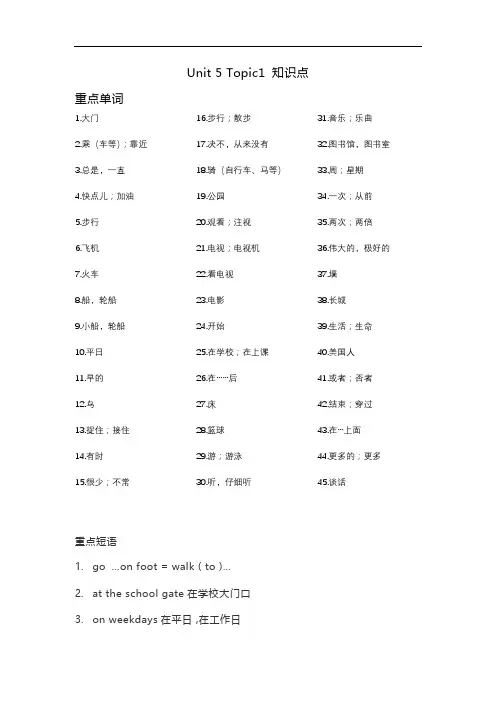
Unit 5 Topic1 知识点重点单词1.大门2.乘(车等);靠近3.总是,一直4.快点儿;加油5.步行6.飞机7.火车8.船,轮船9.小船,轮船10.平日11.早的12.鸟13.捉住;接住14.有时15.很少;不常16.步行;散步17.决不,从来没有18.骑(自行车、马等)19.公园20.观看;注视21.电视;电视机22.看电视23.电影24.开始25.在学校;在上课26.在……后27.床28.篮球29.游;游泳30.听,仔细听31.音乐;乐曲32.图书馆,图书室33.周;星期34.一次;从前35.两次;两倍36.伟大的,极好的37.墙38.长城39.生活;生命40.美国人41.或者;否者42.结束;穿过43.在…上面44.更多的;更多45.谈话重点短语1.go …on foot = walk ( to )…2.at the school gate在学校大门口3.on weekdays在平日 ,在工作日4.on weekends=on the weekend在周末5.You are right. = That’s right. 你是对的。
6.play soccer 踢足球7.see a movie 看电影8.get up 起床9.after school 放学后10.after class 下课后11.after breakfast / lunch / supper12.早餐 / 午餐 / 晚餐后13.at school 在学校、在上课14.play soccer/basketball 踢足球/打篮球15.go swimming/fishing 去游泳/钓鱼16.listen to music 听音乐17.watch TV 看电视18.d o one’s homework 做作业19.go to the zoo/ park 去动物园 / 公园20.read books/a book 读书21.in o ne’s free time在某人空闲时间22.have a rest 休息一下23.meet friends 拜访朋友24.once/twice/three times a week 一周一/两/三次25.very often 经常26.every day 每天e to the library 来图书馆28.时间表达:i.8:00 eight o’clockii.9:05 nine o fiveiii.10:15 ten fifteen / a quarter past teniv.11:30 eleven thirty / half past elevenv.12:45 twelve forty-five/ a quarter to onevi.17:50 seventeen fifty / ten to eighteen29.go to bed 上床睡觉30.talk with / to sb.与某人谈话31.at school 在学校、在上课32.go to school 去上学33.and so on ……等等34.go to…on foot= walk to… 步行去…35.go to…by bike = ride a bike to… 骑自行车去…36.go to…by car = drive a car to… 开车去…37.go to…by plane = fly to… 乘飞机去…38.go to…by subway/underground39.= take the subway/ underground to… 乘地铁去…40.go to…by bus/train/ship/boat = take a bus/ train/ship/boat toi.乘公共汽车/火车/轮船/小船去…重点句型1. Happy New Year!The same to you.2. Your new bike looks very nice. Thank you.3. — How do you usually come to school?—I usually come to school by subway.4. —How often do you go to the library?—Once/Twice/Three times a week/Very often/Every day/Seldom(对划线部分进行提问)What time does the class begin? / What time do the classes begin?7. We have no more time. 我们没有更多的时间了。
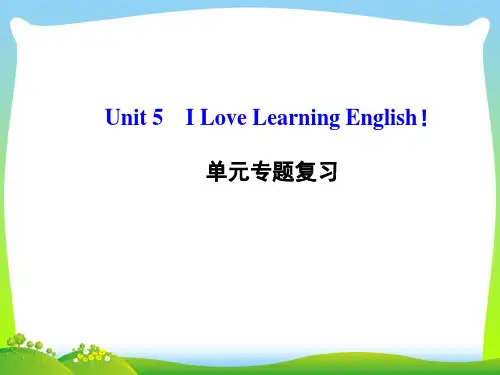
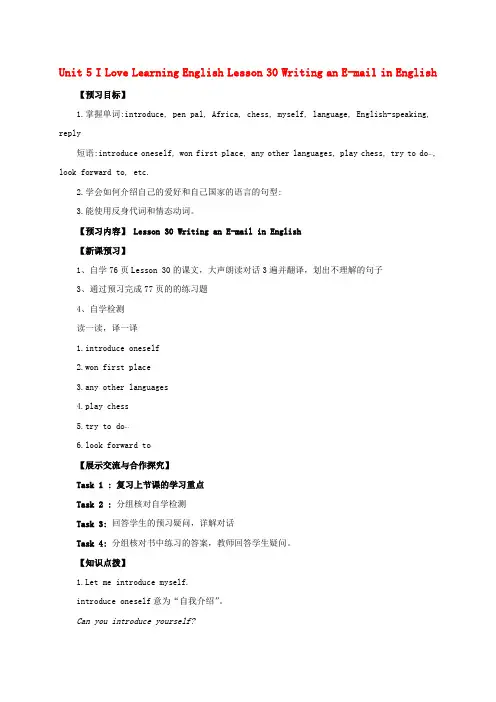
Unit 5 I Love Learning English Lesson 30 Writing an E-mail in English 【预习目标】1.掌握单词:introduce, pen pal, Africa, chess, myself, language, English-speaking, reply短语:introduce oneself, won first place, any other languages, play chess, try to do…, look forward to, etc.2.学会如何介绍自己的爱好和自己国家的语言的句型:3.能使用反身代词和情态动词。
【预习内容】Lesson 30 Writing an E-mail in English【新课预习】1、自学76页Lesson 30的课文,大声朗读对话3遍并翻译,划出不理解的句子3、通过预习完成77页的的练习题4、自学检测读一读,译一译1.introduce oneself2.won first place3.any other languages4.play chess5.try to do…6.look forward to【展示交流与合作探究】Task 1 : 复习上节课的学习重点Task 2 :分组核对自学检测Task 3: 回答学生的预习疑问,详解对话Task 4: 分组核对书中练习的答案,教师回答学生疑问。
【知识点拨】1.Let me introduce myself.introduce oneself意为“自我介绍”。
Can you introduce yourself?你能介绍你自己吗?【拓展】introduce后跟双宾语时,只能用introduce sth./sb.to sb.。
Can you introduce the book to me?你能把这本书介绍给我吗?Can you introduce your friend to me?你能把你的朋友介绍给我吗?2.I live with my mother and father.live with sb.意为“和某人住在一起”。
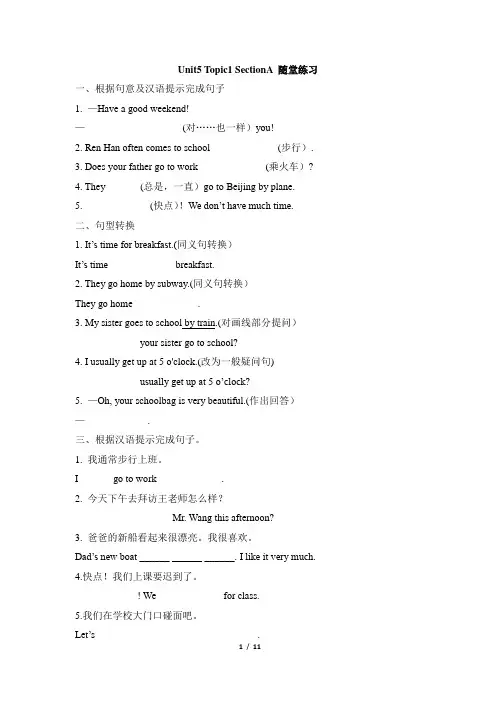
Unit5 Topic1 SectionA 随堂练习一、根据句意及汉语提示完成句子1. —Have a good weekend!—______ ______ ______ (对……也一样)you!2. Ren Han often comes to school ______ ______ (步行).3. Does your father go to work ______ ______ (乘火车)?4. They ______ (总是,一直)go to Beijing by plane.5. ______ ______ (快点)!We don’t have much time.二、句型转换1. It’s time for breakfast.(同义句转换)It’s time ______ ______ breakfast.2. They go home by subway.(同义句转换)They go home ______ ______.3. My sister goes to school by train.(对画线部分提问)______ ______ your sister go to school?4. I usually get up at 5 o'clock.(改为一般疑问句)______ ______ usually get up at 5 o’clock?5. —Oh, your schoolbag is very beautiful.(作出回答)—______ ______.三、根据汉语提示完成句子。
1. 我通常步行上班。
I ______ go to work ______ ______.2. 今天下午去拜访王老师怎么样?______ ______ ______ Mr. Wang this afternoon?3. 爸爸的新船看起来很漂亮。
我很喜欢。
Dad’s new boat ______ ______ ______. I like it very much.4.快点!我们上课要迟到了。
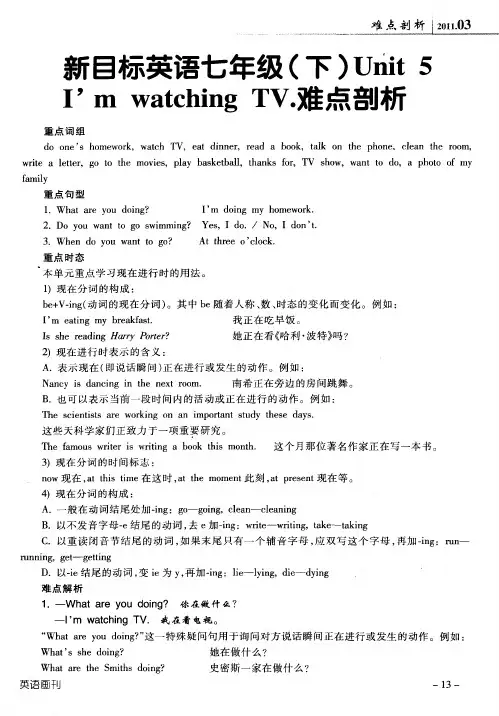

冀教版英语七下Unit 5《I Love Learning English》单元说课稿一. 教材分析冀教版英语七下Unit 5《I Love Learning English》是一个以学习英语为主题的单元。
通过本单元的学习,学生可以掌握一些与学习英语相关的词汇和表达方式,提高他们的英语运用能力。
本单元的主要内容包括:课文阅读、词汇学习、语法讲解、听力练习、口语表达、写作训练等。
此外,本单元还注重培养学生的学习兴趣和自主学习能力,使他们更加热爱学习英语。
二. 学情分析在学习本单元之前,学生已经掌握了部分英语基础知识,具备一定的听、说、读、写能力。
但他们在学习过程中仍存在一些问题,如:词汇量不足、语法掌握不牢固、学习方法不恰当等。
针对这些问题,教师需要在教学过程中给予学生更多的关注和指导,帮助他们克服困难,提高英语水平。
三. 说教学目标1.知识目标:学生能熟练掌握本单元的词汇、语法和表达方式,了解学习英语的重要性。
2.能力目标:学生能听懂、会说、会读、会写与学习英语相关的句子,提高他们的英语运用能力。
3.情感目标:培养学生热爱学习英语的兴趣,激发他们自主学习英语的动力。
四. 说教学重难点1.重点:本单元的词汇、语法和表达方式。
2.难点:如何运用所学知识进行实际交流和运用。
五. 说教学方法与手段1.教学方法:采用任务型教学法、情境教学法和交际教学法,让学生在实际情境中学习、运用英语。
2.教学手段:利用多媒体课件、图片、实物等辅助教学,提高学生的学习兴趣和参与度。
六. 说教学过程1.导入:通过播放英语歌曲或讲述一个与学习英语相关的故事,激发学生的学习兴趣。
2.呈现:展示本课的主题,引导学生进入学习状态。
3.学习:分阶段进行词汇、语法和表达方式的学习,让学生在实际情境中掌握知识。
4.实践:学生进行小组讨论、角色扮演等互动活动,让学生在实际交流中运用所学知识。
5.巩固:通过听力练习、口语表达、写作训练等方式,巩固所学知识。
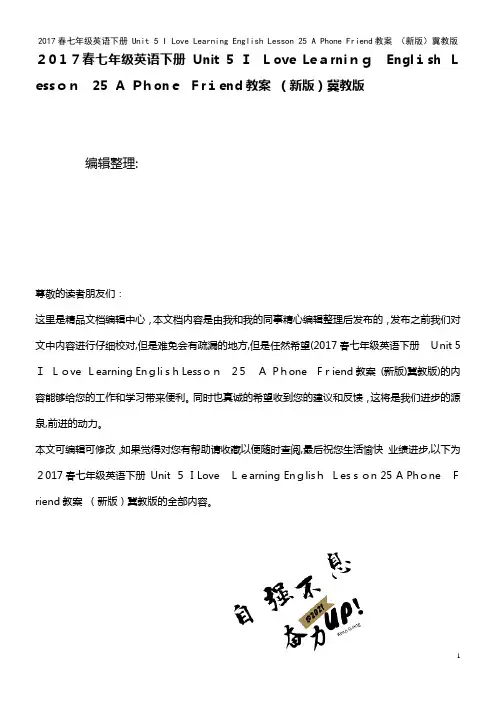
2017春七年级英语下册Unit 5 ILove LearningEnglish Lesson25 APhoneFriend教案(新版)冀教版编辑整理:尊敬的读者朋友们:这里是精品文档编辑中心,本文档内容是由我和我的同事精心编辑整理后发布的,发布之前我们对文中内容进行仔细校对,但是难免会有疏漏的地方,但是任然希望(2017春七年级英语下册Unit 5 ILove Learning English Lesson25APhone Friend教案(新版)冀教版)的内容能够给您的工作和学习带来便利。
同时也真诚的希望收到您的建议和反馈,这将是我们进步的源泉,前进的动力。
本文可编辑可修改,如果觉得对您有帮助请收藏以便随时查阅,最后祝您生活愉快业绩进步,以下为2017春七年级英语下册Unit 5I Love Learning EnglishLesson 25 A Phone Friend教案(新版)冀教版的全部内容。
Unit 5练习答案:1-5 DACDC以上就是本文的全部内容,可以编辑修改。
高尔基说过:“书是人类进步的阶梯。
”我希望各位朋友能借助这个阶梯不断进步。
物质生活极大丰富,科学技术飞速发展,这一切逐渐改变了人们的学习和休闲的方式。
很多人已经不再如饥似渴地追逐一篇文档了,但只要你依然有着这样一份小小的坚持,你就会不断成长进步,当纷繁复杂的世界牵引着我们疲于向外追逐的时候,阅读一文或者做一道题却让我们静下心来,回归自我。
用学习来激活我们的想象力和思维,建立我们的信仰,从而保有我们纯粹的精神世界,抵御外部世界的袭扰。
The above isthe whole content of thisarticle, Gorky said:"the book is theladder of humanprogress." I hope yo ucan make progress with the help of this ladder. Material l ife is extremely rich, scienceand technology are developing rapidly,all of which graduallychange the way ofpeople's study andleisure. Manypeopleare nolonger eagertopursue a document, but as long as you stillhave such a small persistence, you willcontinueto grow and pro gress.When the complex world leads us to chase out, readingan article or doing a problem makes us calm down andreturn to ourselves.With learning,we can activate ourimagination and thinking,establish our belief,keep ourpure spiritual world and resist theattack of the external world.。
七年级英语下册Unit5ILoveLearningEnglish词句精讲精练oveLearning English!词句精讲精练词汇精讲1. reply(1) reply作名词时,意为“回答,答复”。
例如:I need your reply. 我需要你的答复。
His reply made me unhappy. 他的答复让我不高兴。
(2) 与reply有关的短语:make a reply作答 make no reply不作答复 in reply to…为答复……例如:You must make a reply now. 你必须现在作出答复。
He made no reply and left in a hurry. 他没作答复就匆匆离开了。
He is going to attend the meeting in reply to the reporters.为答复记者他将出席这次会议。
【拓展】You must reply to/answer this letter. 你必须回复这封信。
Do you know the answer to the question?你知道这个问题的答案吗?2. be proud ofproud 是形容词,常用结构:be proud of sth. 意为“以……而骄傲”。
例如:I am very proud of being a Chinese. 作为一名人我很自豪The young should be proud of their own culture.年轻人应该以他们自己的文化而自豪。
【拓展】(1) be proud to do sth 意为“为做某事而骄傲”。
例如:We are proud to be a league member. 我们为成为团员而骄傲。
(2) pride是名词,意为“骄傲,自豪”。
常用的结构: take pride in sth. 意为“为某事骄傲”。
冀教版七年级英语下册Unit 5过关测试一、单项选择(每小题1. 5分,共15分)1. I can't believe ________a little bird can eat________ much food.A. so; soB. such; suchC. so; suchD. such; so2. Many students write to Language Doctor to________ advice about learning English.A. look throughB. ask forC. give upD. worry about3. I need to send many old ________to my grandpa in the village.A. newsB. magazineC. photoD. newspapers4. —Is the film interesting?—I thought it would be. But ________,it's very boring.A. in allB. in factC. in a hurryD. in future5. —Wow, your sweater is very beautiful!—Thank you. I bought it two days ago. It ________ me $50.A. tookB. costC. paidD. spent6. Your parents will________ you if you study hard and get good grades at school.A. are proud ofB. be proud ofC. take prideD. take proud in7. Do you often make________ in grammar?A. mistakeB. mistakesC. some mistakesD. a few mistake8. Teachers should ______better ______ their students.A. communicate; withB. communicate; toC. to communicate; withD. communicated; by9. Please connect the phone ______the computer.A. atB. intoC. ofD. to10. Can you ________the star singer ________us?A. introduce; toB. introduces; toC. introduce; withD. introduces; with二、完形填空(每小题1. 5分,共15分)You may think that English dictionaries have been used for many, many centuries. In fact, an English dictionary you ________11 today wasn't made until the Qing Dynasty (清朝). Three men did most of the important ________12work on dictionaries. They spent nearly all their lives trying to ________13words for their dictionaries. For them, it was a wonderful journey. The largest dictionary in the world is the Oxford English Dictionary. The________14for this dictionary camefrom an important meeting in Britain in 1857. Twenty - two years later, Oxford University asked James Murray to be the editor of its new dictionary.Murray had never been to________15. At the age of fourteen, he lefthis village school in Scotland and taught himself while working in a bank.________16he became a great teacher. After Oxford gave him the job,Murray had a small house ________17in his garden to do the work. Everymorning, Murray got out of bed at five o'clock and ________18in thesmall house several hours before breakfast. Often he would work into thenight. Murray hoped to finish the new dictionary in ten years. But after five years, he was ________19 adding (增加) words for the letter “A”! He worked on the dictionary ________20he was very old.Forty - four years later, in 1928, other editors finished the dictionary.11. A. write B. use C. copy D. miss12. A. easy B. boring C. early D. dangerous13. A. spell B. collect C. invent D. make14. A. way B. use C. idea D. prize15. A. school B. cinema C. village D. college16. A. Ever since B. Before C. So far D. Later17. A. built B. sold C. broken D. drawn18. A. read B. wrote C. worked D. thought19. A. already B. still C. usually D. always20. A. if B. because C. until D. since三、阅读理解(每小题3分,共15分)Zhao Xing's BlogHi, I'm Zhao Xing from Beijing. My English is not very good. There will be an English competition next month. I feel very nervous and I don't know how to improve my English. I think I'm going mad! So I need some help now! Any good suggestions?Amy, ChinaHi, Zhao Xing! I know how you're feeling. There must be many people like you. Why don't you get together and start an English club? You can talk to each other about your English study and your worries. It's a great way to improve your English and enjoy yourself!Daniel, SpainIt's a good idea to read English newspapers. There is China Daily, isn't there? Get your notebook out and write down the new words!Sam, AustraliaHow about getting a pen pal? I'd be happy to be yours. We can send each other e-mails. Good luck with your competition. Take a deep breath (深呼吸),smile and you'll feel better!21. Who is asking for help?A. Zhao Xing.B. Amy.C. Daniel.D. Sam.22. What does the underlined word “mad” mean in Chinese?A. 羞涩的B. 害怕的C. 发疯的D. 伤心的23. What's Amy's suggestion?A. Starting an English club.B. Reading English newspapers.C. Getting a pen pal from an English - speaking country.D. Talking with friends in English by phone.24. Where does Daniel come from?A. China.B. Spain.C. Australia.D. Canada.25. Which of the following is TRUE?A. Zhao Xing will have an English competition next week.B. Zhao Xing and Amy are both Chinese.C. Daniel thinks watching English movies is a good way to improve English.D. Sam would like to be Zhao Xing's teacher.四、任务型阅读(每小题3分,共15分)Reading an English newspaper is a good way to improve astudent's language ability. As there are many useful and commonwords in an English newspaper, it may help students increasetheir vocabulary(词汇量)and improve their reading skills. Theycan learn new knowledge from newspapers. But what is theproper way to read an English newspaper? Do students need tolook over all the content(内容)of the newspaper?The first step is to choose a right newspaper with good language. Then turn to the front page and read the headlines(标题)to know what has happened. As the most important things are put on the front page, it's easy to find out what you're interested in and then turn to the page to read it completely. There is no need to go through all the articles.Secondly, read newspapers every day. Remember words through the context(上下文), in which these words may appear repeatedly. Once they appear several times, you will remember them easily. Don't look up every unknown word in your dictionary. You can try to guess the meaning between sentences. If your guess is wrong, don't give up. Keep reading, and you will become familiar with the words after reading them several times in different texts.Reading English newspapers makes us knowledgeable. It can not only help us know what is happening in the world but also improve our language.26~27题完成句子; 28题简略回答问题; 29题找出并写下本文的主题句; 30题将文中画线句子译成汉语。
仁爱英语七年级下Unit5Topic1练习题Unit5Topic1SectionA练习题一、单项选择1.Let’smeet____theschoolonfoot.A. inB.toC.atD.for2.It’stime____gotobed.A. oftenB.forC.onD.to3.AllengetstoNewYork___.A.bytheplaneB.onplaneC.byplaneD.inplane4.It’stime____supper.A.atB.forC.toD.on5.—_____youoftencometoschoolonyourbike? —______Yes,I_____.A. Do,doB.Are,areC.Does,doesD.Is,is6.—Howdoyouusuallycometoschool? —Iusuallycometoschool____foot.A. InB.byC.withD.on7.Shelooks_____.Askhertohelpyou.A.oldB.sorryC.wellD.kind8.—____doyouusuallygotoschool? —Bybike.A.WhatB.WhenC.HowD.Which9.—HappyNewYear!—________!A.ThankyouB.NotatallC.ThesametoyouD.Youarewelcome10.Myboolisinteresting._____yours?A.WhatisB.WhoseisC.HowaboutD.Whatislike二、句型转换1.Tomusuallydrivestowork.(变同义句)Tomusually_____ ___________ ____________.2.我们中有五人骑自行车上学。
(完成译句)Five____usgotoschool_____ _____.3.Theboyusuallygoestoschoolbybike.(对划线部分提问)___________theboyusuallygotoschool? 4.Icometoschoolinmymother’scartoday.(对划线部分提问)__________youcometoschooltoday?5.Mr.Leegoestoworkbybus.(变为一般疑问句并作肯定回答)_____Mr.Lee____toworkbybus?Yes,___________.6.该睡觉了。
班级 姓名 考场 考号 座位号 号-------------------------○密--------------------------------------○封------------------------------------○线----------------------※※※※※※※※※※※※答※※※※※※※※※※※※※※※※※※题※※※※※※※※※※※※※※※※※线※※※※※※※※※※Unit 5 I’m watching TV. 讲解与练习讲解一、词组1. watch TV 看电视2. a little bird 一只小鸟3. read a book = read books = do some reading 读书4. go to the movies 看电影5. do homework = do one's homework(不可数) 做家庭作业(one's 在人称和数上与主语保持一致)5. swim = have a swim = go swimming 游泳6. shop = go shopping = do some shopping 购物7. play basketball / soccer 打/踢 篮球/足球8. talk on the phone 打电话9.clean the room 打扫房间 10.take photos 拍照 11. wait for sb. to do sth. 等候某人做某事 12. swim at the pool 在游泳池里游泳13. in the library 在图书馆 14. at home /school 在家里/学校 15.in/on the tree 在树上(其中in 后加上去的,on 是树上长的)16. in the first/ next/ last photo 在第一张/下一张/最后一张照片里 21. be with sb. 和某人在一起二、句型1.询问和表达―正在进行的动作‖句型:What+be(am,is ,are)+主语+doing? ….正在做什么? 回答:主语+be(am,is ,are)+doing. …正在做某事。